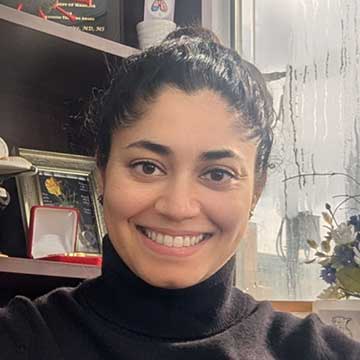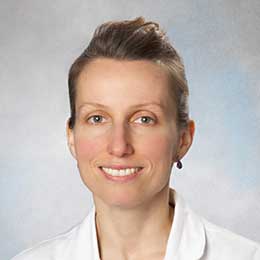Seizing the Opportunity: Women in Research
March 16, 2023
To commemorate Women’s History Month, we’re spotlighting the work of women in medicine to showcase the incredible impact they’re making on the field and on the delivery of patient care around the globe.
We spoke with grant winners, Debasree Banerjee, MD, MS, FCCP, and Dawn DeMeo, MD, to learn more about the progress of their research projects, the role mentorship has played in their careers, and what Women’s History Month means to them.
Debasree Banerjee, MD, MS, FCCP
Research Grant in Pulmonary Arterial Hypertension, 2015-2017

Debasree Banerjee,
MD, MS, FCCP

Debasree Banerjee,
MD, MS, FCCP
In 2015-2017 you received a grant to focus on pulmonary arterial hypertension (PAH), can you tell us what you were hoping to accomplish and where that research stands today?
We were hoping to find biomarkers for sudden cardiac death in patients with PAH. By collaborating with the lab of Dr. Samuel Dudley, an electrophysiologist, we found a plausible target: an alternatively spliced sodium channel that results in arrhythmias that can lead to sudden cardiac death that was elevated in PAH patients compared with healthy controls. This was a small study, but the levels of this splice variant also correlated with increased oxygen consumption and markers of glycolysis and, in some patients, also tracked with right ventricular metabolic function as measured by PET scan. Since my fellowship, I have become full-time clinical faculty and have not pursued further investigation of this study, but my mentor, Dr. Corey Ventetuolo, remains a leader in translational work in PAH.
What role has mentorship played in your career, and what makes a strong mentor in your opinion?
Mentorship is the key to a successful academic career. Dr. Ventetuolo continues to serve as a career mentor and helps with sponsorship for my current scholarly work which revolves around diversity, equity, and inclusion in medicine, both patient-facing and also within the hierarchy of academic medicine. A good mentor encourages growth and creativity; they are hands-on to help troubleshoot and problem solve, but also keep the bigger picture in mind so as to lead the mentee through a project that is feasible and can be accomplished within the time frame. This project should be a stepping stone for deeper investigation into a field that can build the mentee’s career. Certainly, though I did not continue in PAH work, I feel that a lot of the skills I gained [with this work] are transferable, and I continue to take the lessons I learned with me into my practice every day.
What advice do you wish you had received sooner in your career, and what would you like to say to early career female clinicians?
It's hard to know for sure because my path has led me to a very satisfying career, in terms of intellectual stimulation, service, and education. I do think the balance between a job that can be all-consuming because of its breadth and depth (and scholarly aspects) and personal goals for family, physical fitness, hobbies, etc, can easily be skewed. Thus, I feel setting clear boundaries on what is work time and what is home time is something I wish I had done earlier in my career (and can even stand to work on more now!).
I also think it's important for junior clinicians to know that your niche or passion may emerge in time and that one's career is dynamic, in the best ways. Being open to opportunities that come up and reflecting on whether it is something that you want to pursue can really result in a lot of career satisfaction.
What does Women's History Month mean to you?
There is a weight that women have carried, particularly in our field, and I like to use this time to think about the significant challenges those before me have had to overcome in order for me to enjoy the privileges I have today. These foremothers also remind me that there is always more work to be done.
Dawn DeMeo, MD
Research Grant in Chronic Obstructive Pulmonary Disease, 2016

Dawn DeMeo, MD

Dawn DeMeo, MD
In 2016, you received a grant to explore chronic obstructive pulmonary disease (COPD). Can you tell us what you were hoping to accomplish and where that research stands today?
I am incredibly grateful to the CHEST Foundation for supporting our work to understand COPD disparities through the analysis of omics data. Through that work, and our ongoing multidisciplinary collaborations, we want to uncover molecular features driving differences in COPD susceptibility, progression, and resilience. This program has evolved to address sex and gender disparities in lung disease. I believe that the best approach to treating women and men with lung disease will be informed by addressing sex as a biologic construct and gender as a societal construct. Early support from the CHEST Foundation and other career development awards have encouraged me to see this approach toward innovating in precision medicine. Through the growth of National Institutes of Health-supported initiatives such as the National Heart, Lung, and Blood Institute’s Trans-Omics for Precision Medicine program, we now are able to effectively scale our molecular research toward clinical-translational relevance.
What role has mentorship played in your career, and what makes a strong mentor in your opinion?
Early support for women in science and medicine can have an impact that is unexpected and enduring; this has been my experience at every stage of my career. I have been so fortunate to have excellent scientific mentors since my first basic science research experience in college. Although my current research in COPD could not be more distant from this early experience, I learned scientific method, hypothesis generation and testing, and the joy of discovery. Mentorship, both clinical and scientific, has informed the enthusiasm and sense of urgency I have to understand COPD. My mentors have taught me to be resilient and persistent. Above all, mentorship has taught me that discovery takes a village, and thoughtful collaborations will move the field forward. Medical research is a long-term commitment, and strong mentors invest beyond fellowship and K grant time frames to provide guidance, support, and advocacy. This longitudinal mentoring has been a gift for me and a critical example—my mentors from my fellowship more than 2 decades ago remain my mentors now, and I hope to support that long-term engagement toward my own trainees.
What advice do you wish you had received sooner in your career, and what would you like to say to early career women clinicians?
I think the most important advice I have received relates to time management and career advancement. With the many hats we wear in our early careers, time to write and be creative often is sacrificed. This is also true about time put toward career development and advancement opportunities. I recommend that trainees start early, keeping track of their time and [carving] out protected time to write.
An additional piece of advice is not my own but Voltaire’s: Let’s not let perfect be the enemy of the good. As clinicians we are all perfectionists, but, sometimes, we need to set early ideas and work free to be impactful and refined.
What does Women's History Month mean to you?
Women’s History Month is [not only] a time to reflect upon the innovation and success of women in many domains, but it is also a reflection on the pathways forged by women to secure opportunity, equality, and justice. Women’s History Month is a good time to explore the National Library of Medicine’s website, Changing the Face of Medicine. Women physicians and scientists are no longer in the shadows, but this is just a starting point.
It is an important time to reflect on key insights about the lungs and lung disease that were driven by women and the promise of women in pulmonary [medicine] to impact the future of innovation and translational science.
Women’s History Month is also a clear reminder that we all have a responsibility to support the curiosity and education of young girls in STEM. Mentorship and advocacy across all ages and stages will ensure the continued achievement of women in science and medicine.
Want to expand the impact of your own work? Submit an application for an open grant by Monday, April 10, 2023.